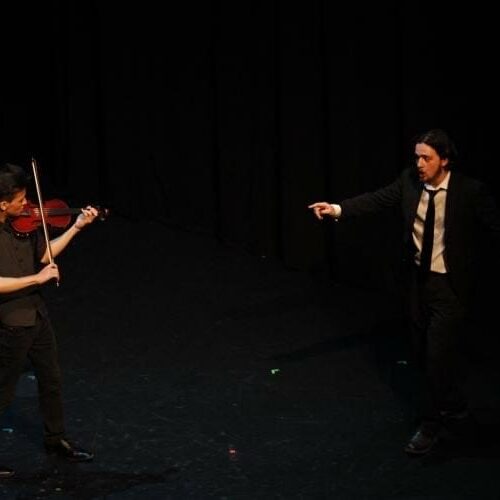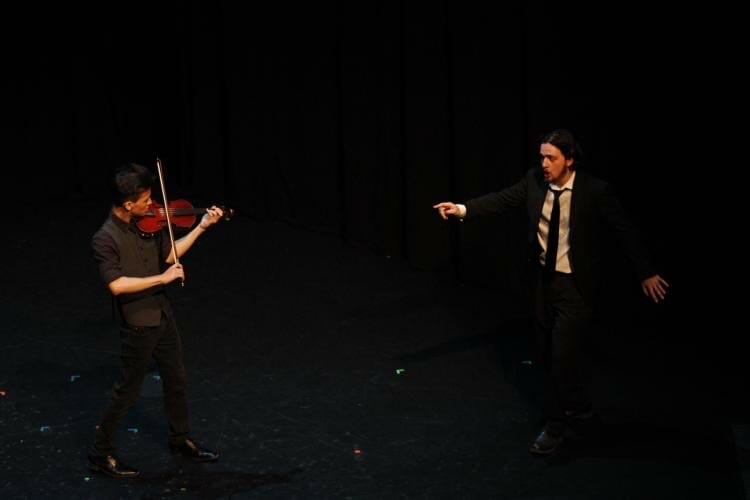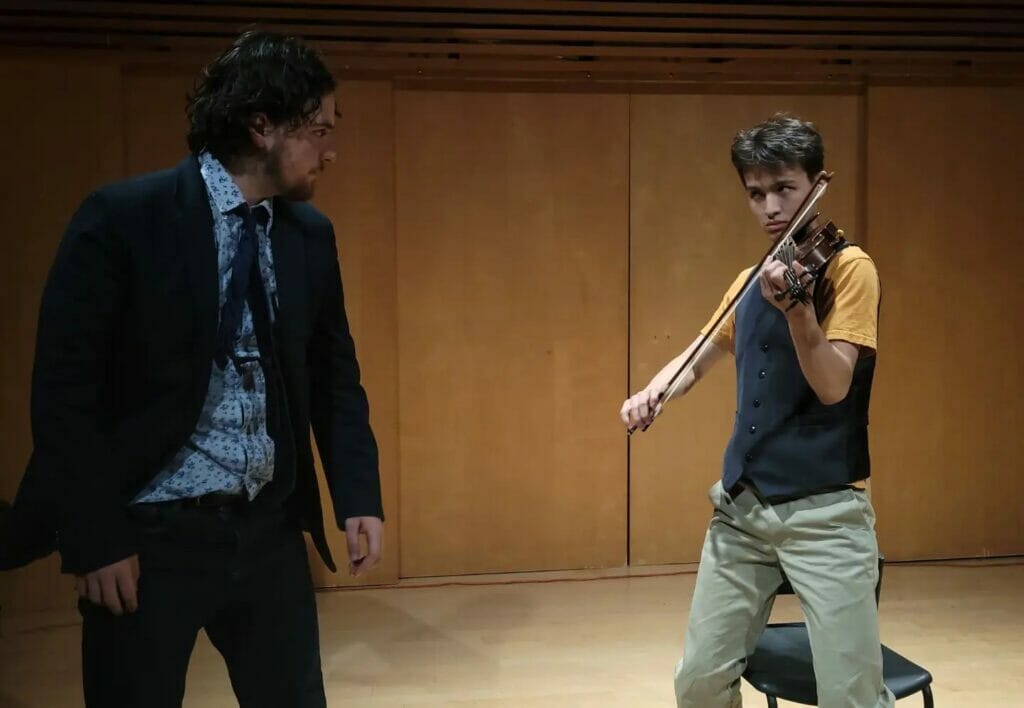
Nice Guy is unnerving and essential
The bilingual Fringe Festival show from director “Disco” Labrie is an arresting portrayal of toxic masculinity and abuse
The action of referring to someone as a “nice guy” has gone through an ugly metamorphosis in the last decade. In the past, one would use such a term in a literal sense. Now, it serves as a title bestowed upon men who are courteous towards women, only with the intention of receiving some sort of favour or affection in return. It is a persona that Olivier Blais and Marianne “Disco” Labrie clearly intend to attack with their Halifax Fringe Festival debut, the aptly titled Nice Guy.

Reflecting reality
From the opening seconds of the play, there is a sense of discomfort. Once seats are quietly filled at the Neptune Theatre’s Scotiabank Stage, the lights dim. A thin blue haze lights the stage and a dishevelled man in a suit hunches with his back to the audience.
To his right: a lone violinist, portrayed by Jérémie Boudreau, plays a haunting solo tune. The tone of the play is set within an instant. This man, whatever his story may be, is not stable.
What follows is an extended rant on behalf of the main character, Matt, played by Blais. With a colourful emotional palette, he addresses the audience directly, as if they are the guests at his father’s funeral. This connection with the audience is essential for what Labrie and Blais are trying to achieve with this piece.
“I actually studied people like Andrew Tate for this role,” says Blais. “We wanted the audience to notice the red flags in this ‘nice guy,’ so it was really important to have that [connection with the audience].”
Charm, misogyny and rage
As Matt’s rant progresses, his character shifts. At first, he is brutally honest but charming- the crowd often chuckles when he cracks a joke.
Then, he grows frustrated with the audience, shouting and garnering a deafening silence before begging for their forgiveness.
When this yields more silence, he resorts to simply verbally assaulting them.
Matt is designed to treat the audience just as abusive men have treated partners and the effect is crushing. Some members of the crowd avert their eyes as Blais’s gaze tears through the seating area like laser beams. A cycle of pity and anger fuels the flames of his performance, realizing his irrefutably disgusting volleys of poisonous misogyny with gripping vigour.
Making French art accessible
On top of delivering pulse-pounding writing and acting, the play was the only bilingual and thus the only French-language show at the 2022 Halifax Fringe Festival. The production comes from Théâtre DesAssimilés, a group co-founded by Labrie and Blais as a means of keeping French theatre productions alive in Nova Scotia.
“We want to make French theatre accessible to the English audience here, because there’s not a lot of French art in general, yet it’s such a big part of Nova Scotia with the Acadian community and other French-speaking families,” says Labrie.
Assembling a francophone play for an English-speaking audience was not a simple Google Translate job. With various expressions that become nonsensical when shifted from one language to another, the translation contributed significantly to the time spent in development. Furthermore, having the play in both languages allows Labrie and Blais to reach a wider audience and educate more people on the dangers of abusive masculinity.

Through the eyes of the audience
I only had the chance to see the English showing of the play, but what I saw was mesmerizing.
The character of Matt occupies the majority of the runtime, his rants often veer off into memories, illustrated using light, colour and only the sound of Boudreau’s violin.
Boudreau’s role is an exercise in versatility. The violin is in the background so that the play is more than just Blais’ voice — but it is also the sound of a speeding car, a spoken voice or an irreconcilable psyche reaching a fever pitch. Boudreau becomes the conscience, the grim reaper and the soundtrack, all without opening his mouth.
“The end of the play is a tad abrupt, but the final moments with Emily, Matt’s abused partner portrayed by Zoë Comeau, are essential to this story of a self-consuming serpent of a man,” Boudreau said. “As she shares her experience, the portrait of Matt’s character is completed, revealing dark undertones. These scenes are heart-wrenching and somewhat exhausting to watch and the play is all the better for it.”
In an era of social media, masculinity peddled to lonely teenage boys who find themselves seeking an identity, Nice Guy simply could not come at a better time. It is a relevant, poignant and far from light-hearted piece, demanding the attention of an audience who can learn from the horrors it presents.






